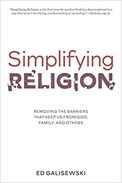
 |
Simplifying Religion: Removing Barriers That Keep Us From God, Family, and Others
by Edward Galisewski
Total Publishing and Media
In the twenty-first century, the connections between spirituality and organized religion appear to be at their weakest. This book offers a way to reconcile the differences by analyzing the way organized religion—specifically Christianity—has functioned for the past fifty years and why millennials are walking away from the traditions their parents grew up with. The author states that living and worshipping by the main aspects of any religion (a hope in a Creator, a need for a Savior, and the ability to connect to a Holy Spirit) can bridge the spiritual gap between the generations.
The author treats the age groups he discusses in the book with great respect and care. He successfully shows the amount of research he has put into understanding what millennials desire spiritually while still appreciating his generation's traditional ways and those before him. Galisewski embraces the values millennials have, and that is how he arrived at the basic pillars for this book. Many hot-button issues are examined, such as homosexuality, traditional worship and teachings, and the inerrancy of the Bible. The author handles these subjects objectively and, through his time interviewing younger people, discovered how outdated many parts of his religion seem.
The chapter on homosexuality is the highlight of the book. The author describes how millennials have created communities diverse in gender, nationality, and sexual orientation at younger ages than older generations, so they do not believe in the inerrancy of the Bible. Through precise linguistic analysis, he strives to debunk Bible passages that teach that certain communities, like the LGBTQIA, are inherently bad or devilish. This book would be an interesting read for religious communities and non-religious ones alike. It sheds light on many disparities between the generations and could promote more understanding and acceptance between them.
RECOMMENDED by the US Review